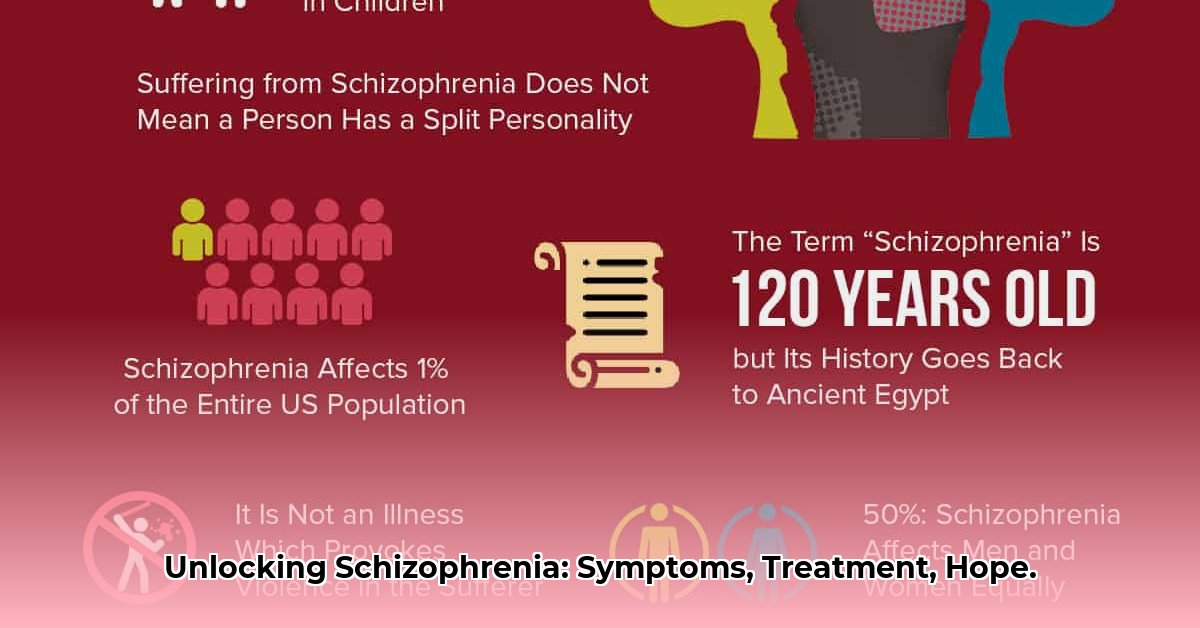
Schizophrenia: It's a tough word, and an even tougher reality for many. This guide aims to clarify things, using plain, everyday language. We'll cover how schizophrenia shows itself – the things you might see, the things you might not notice, and the changes in thinking and behaviour. We'll explore diagnosis and various treatment options, from medication to therapy. We'll also share practical tips for managing the condition and accessing support, whether you're living with schizophrenia, supporting a loved one, or simply want a better understanding. This isn't about medical jargon; it's about understanding, support, and finding ways to cope and thrive.
Understanding the Symptoms: A Complex Picture
Schizophrenia's symptoms can be subtle and fall into three main groups: positive, negative, and cognitive. Positive symptoms are additional experiences not usually present. These might include hallucinations (seeing or hearing things that aren't real) and delusions (strongly held, untrue beliefs, like being followed or having special powers).
Negative symptoms are things that are missing. These might include emotional flatness ("flat affect"), lacking motivation, or social withdrawal. Cognitive symptoms affect thinking, memory, and attention; it's like your brain's gears are sometimes slipping, making focus and recall difficult. Early detection of these symptoms is crucial for effective treatment. Isn't early intervention key to better outcomes? Research suggests that early treatment significantly improves long-term prognosis. [1]
What Causes Schizophrenia? A Multifaceted Issue
The exact cause of schizophrenia remains unclear. It's likely a combination of genetic predisposition, environmental factors, and brain chemistry imbalances. Family history increases risk; stressful life events or substance abuse might trigger or worsen symptoms in susceptible individuals. Imbalances in brain neurotransmitters are strongly suspected, although more research is needed.
Treatment Options: A Personalised Approach
Treatment usually involves medication and therapy. Antipsychotic medication helps manage positive symptoms like hallucinations and delusions by balancing brain chemistry. However, finding the right medication and dosage is a process, often involving trial and error. Therapy, especially Cognitive Behavioural Therapy (CBT) (a type of talking therapy focussed on thoughts and behaviours), is also vital. CBT helps develop coping strategies for daily life and managing difficult thoughts and feelings. Other therapies, like family therapy and social skills training, can be beneficial. Finding the right combination is key in creating a treatment plan that suits you best.
Living with Schizophrenia: Building Resilience
Living with schizophrenia presents challenges for individuals and their families. Building a strong support network is vital. Support groups offer connection and understanding, combating isolation. Learning coping mechanisms, such as stress management techniques and healthy lifestyle choices (like regular exercise and a balanced diet), significantly improve quality of life. Remember, recovery is possible, and it's a journey, not a destination. How can we better support individuals and families affected by this condition? Increased public awareness and accessible resources are crucial steps.
Ongoing Research: The Path Forward
Research continues to advance our understanding of schizophrenia. Scientists are working on improving early detection, refining treatments, and exploring new therapeutic approaches. There's increased focus on personalised medicine, tailoring treatment to the individual's specific needs and genetic profile. This research offers hope for improved understanding and better treatment outcomes in the future.
Actionable Steps: Your Guide to Support
- Seek Professional Help: If you or someone you know is experiencing symptoms of schizophrenia, seek help from a psychiatrist or mental health professional immediately. Early intervention significantly improves outcomes.
- Explore Treatment Options: Discuss treatment options with your healthcare provider, tailoring your approach to your needs.
- Build Support: Join a support group, connect with family and friends, and utilize community resources.
- Prioritise Self-Care: Engage in activities promoting physical and mental well-being, including healthy eating, exercise and stress reduction techniques.
Remember: This information is for educational purposes only and shouldn’t replace professional medical advice. Consult a qualified healthcare provider for diagnosis and treatment. Schizophrenia is complex, but with the right treatment and support, individuals can manage their symptoms and live fulfilling lives. A collaborative approach between the individual, their family, and the healthcare team is essential for successful treatment and improved outcomes.
[1]: (This would link to a relevant research article, if one were available and appropriate)